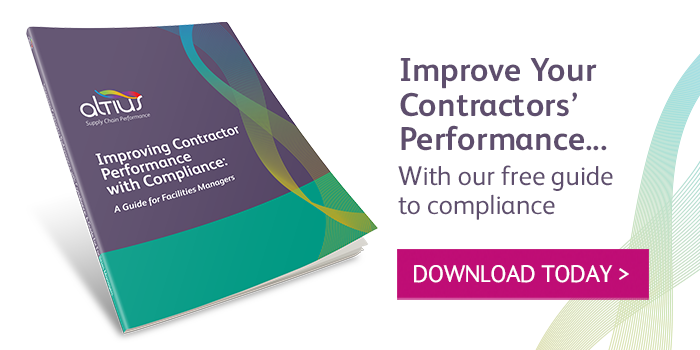
We’ve all got suppliers and contractors that pose a bigger risk to our firm than the rest of our supply chain. Electricians, gas men and contractors working at heights all provide your business with a risk and a potential headache should something go wrong.
While your supply chain compliance procedure should already be able to identify the most capable of new suppliers you employ, it’s important to still risk profile all of your suppliers, new and existing.
Risk profiling

Supplier risk profiling is created by plotting your suppliers on a matrix plotting risk against cost, like the diagram above, and using this to assess your most strategically critical suppliers. From this research, you can plan how to handle suppliers relative to projected risk.
By completing this process, and exposing potential risks with the most critical suppliers, you can then work towards implementing mitigating steps to minimise the cost of non-compliance. Here’s just three ways your supply chain will benefit from doing risk profiling.
Guarantee supplier capability
You should already be auditing your suppliers regularly to not only make sure they are accredited to do the job but also that they are good at what they do too. On top of this standard information, completing a risk profiling may make you think about how rigorously you assess suppliers and how you deploy your valuable resources to best effect.
High-risk suppliers, for example, could cause a revenue risk and collateral damage to both them and your business. To negate issues with employees, products or services they offer, you may think about putting contingency plans into place in the case of an emergency.
Best Practice Guide to Supply Chain Compliance Now Available >
Working with your supplier collaboratively on these contingency plans will hopefully give you a sense of their capability, and prove that if anything did go wrong, your both in a position to react quickly.
The opportunity to lower risk
Once you have carried out risk profiling across your supply chain, you will be able to identify whether or not you need to take more precautions with certain suppliers.
For instance, when carrying out your audits – you need to ask yourself, are there areas where you should be going into more detail, to discover whether both supplier and the clients are achieving the desired outcomes?
The result of your audits will no doubt show areas for improvement – but once you have identified what they are, you’ll be able to put arraqngements in place to mitigate any potential risks. Any opportunity to lower risk within your supply chain shouldn’t be ignored, which is why risk profiling all of your suppliers is integral to your business.
Stay in control of your supply chain
Staying on top of your suppliers and their risks is one of the key aspects of managing a successful supply chain. Following your risk profile, you will know which supplier or suppliers bring the highest risk to your business, and are of the highest cost.
Once you have determined who these are, you will know how much time, you, or your team will need to dedicate to monitoring that supplier and their outputs. This supplier should be at the top of your priority list whenever you carry out audits to ensure that they’re on track. And whenever you’re updating any supplier information – they should be first on your list, so that all insurance or required certifications for the supplier to carry out work are up to date.
Following these points ensures that you’re always keeping on top of your business and your supply chain, enhancing its performance.
Discover the best practice of supply chain compliance…
Risk profiling your suppliers isn’t enough on its own to ensure that the management of your supply chain is efficient and effective – to do that, you need to combine risk profiling and compliance. Maintaining, or even achieving supply chain compliance can be difficult, especially if you’re unsure of the best practices that will help you to reach this point.
If this sounds like a position that you’re in, take a look at the latest and free Altius eBook, An Introduction to Supply Chain Compliance Best Practice.
After reading, you will have an understanding of how to assess the capability of a potential supplier at the start of the process, and explains how to manage and monitor them when they’re on your approved list – get your copy today.

















